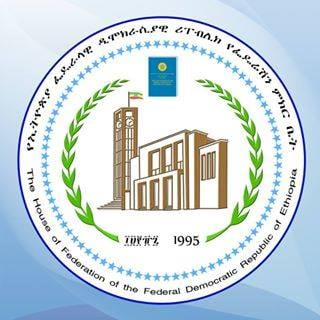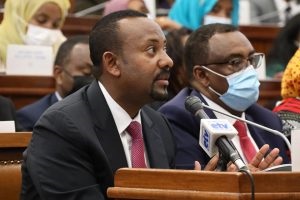
BY ABDUREZAK MOHAMMED
House of Federation (HoF) of the Federal Democratic Republic of Ethiopia (FDRE) is constitutionally mandated to interpret the constitution, organize the council of constitutional inquiry and decide in accordance with the constitution on issues relating to the rights of nations, nationalities, and peoples of Ethiopia.
It has also been authorized to promote the equality of the peoples of Ethiopia enshrined in the constitution, promote and consolidate their unity based on their mutual consent as well as strive to find solutions to dispute or misunderstandings that may arise between states.
It is also responsible to determine the division of revenues derived from joint federal and state tax sources, and subsidizes that the federal government may provide to the states. This law making body is also duty bound to determine civil matters which require the enactment of laws by the House of Peoples’ Representatives (HPR), order the federal government to intervene if any state threatens the constitutional order in violation of the constitutional order, in collaboration with others of course, offer education and training, and whenever necessary. It has also been given the responsibility to carry out research matters pertaining to its responsibility, participate in the process of constitutional amendment, among others.
However, the House has been time and again criticized as it has failing to carry out its constitutional mandates, duties and responsibilities as expected and with the required status quo.
Kidanie Deyasa, law lecturer at Assosa University, said that the responsibilities of the HoF are stated briefly in the constitution of the FDRE, and stipulated in the proclamation No. 251/2001 stating as consolidation of the House of the Federation and the definition of its powers and responsibilities.
In an interview with The Ethiopian Herald, Kidane stated that the House is responsible to find solutions to dispute or misunderstandings that may arise between states, but it has not yet so far fulfilled its responsibilities. “As we all know, in the past years, there were disputes among regional states in different contexts and time interval. For example, the occurrences witnessed between Oromia and SNNP, Afar and Somali, Amhara and Benishangul Gumuz can be cited a case in point in that regard. The house has not well devised lasting solutions to the problems created in the aforesaid and the not yet mentioned places as properly and diligently possible,” he indicated.
As to him, the main reason for such a poor performance was its lack of neutrality. All members of the House of Federation (HoF) are still members of the ruling party (Ethiopian Peoples’ Revolutionary Democratic Front (EPRDF) in its former name though converted into prosperity since recently). Surprisingly, many of the house members are higher government officials. Hence, being a political affiliation even party member at a broader scale could hardly allow members to be impartial.
He further noted that there are also engagement overlaps as HoF members are also members of the council of regional states. There was also party influence. Because of this HoF members’ decisions were not neutral as expected.
He also stated that 62 (4) of the FDRE Constitution stipulates that the House shall promote the equality of the peoples of Ethiopia enshrined in the Constitution and promote and consolidate their unity based on their mutual consent. However, ‘equality of peoples’ does not mean celebrating ‘Nations, Nationalities and Peoples’ Day’ once a year. “It is about working to enable peoples to participate in various political and administration structures.”
He said that, over the years, the House has not worked for deep-rooted unity among the Ethiopian people.
In future, the House must properly discharge its constitutional responsibilities as required, he stressed, adding that the House should also focus on strengthening the national unity.
He also urged that it is not appropriate for HoF members to come from councils of regional states if neutrality and proper public service is demanded. As to him, if the members of the House were elected with the direct participation of the people, they would be less likely to fall under the influence of the party ideology.
Public Relation Director of the House of Federation Terefe Bedada agrees with the comment of the aforementioned legal expert. He indicated that in the years before the national reform, there were gaps in the discharge of its constitutional responsibilities.
Over the past years, instead of strengthening national unity, divisive work had been done, the federalism system that was being implemented in the country was pseudo federalism, he added.
He further stated that there were serious violations of human rights across the country; and there have been targeted displacements and death of citizens as well as destruction of property. “Many public questions have not been properly addressed as there are problems in executing activities and the presence of many laws that had a problem with transparency, he also indicated.
It is undeniable fact that there were widespread public protests across the country over the inadequacy of true federalism in the country, as to him.
One indication of the lack of a true federalism system in the country was the federal government’s groundless interference in state affairs, he said, adding that there was no clear law that regulates the way in which states interrelate with their counterparts—states—and the federal government.
Because of the absence of clear law, decisions were made with the goodwill of individuals or groups. There was also the intervention of executive bodies on the decisions of the House of Federation, according to him.
He also reported that there have been activities that could endanger the unity of the country as a result of the House and other institutions failing to fulfill their responsibilities properly. “Some individuals and groups tried to be above the law of the country,” he added.
He further explained that currently various reform activities are being done to enable the House to carry out its constitutional mandates properly. As to him, except for the ones that require public discussion and require much more time to be dealt with, most of the repressive laws have been amended.
The council is working in collaboration with research institutes, he said, adding that various studies are being conducted on the activities of the House in collaboration with Addis Ababa University. “The move towards setting up research centers and strengthening existing ones will continue,” he noted.
There are a lot of diplomatic activities undertaking with countries that follow federalism, he said adding that a lot of work will be done to strengthen these activities and make our federal system vibrant and comprehensive enough
The Ethiopian Herald 21 March 2021


